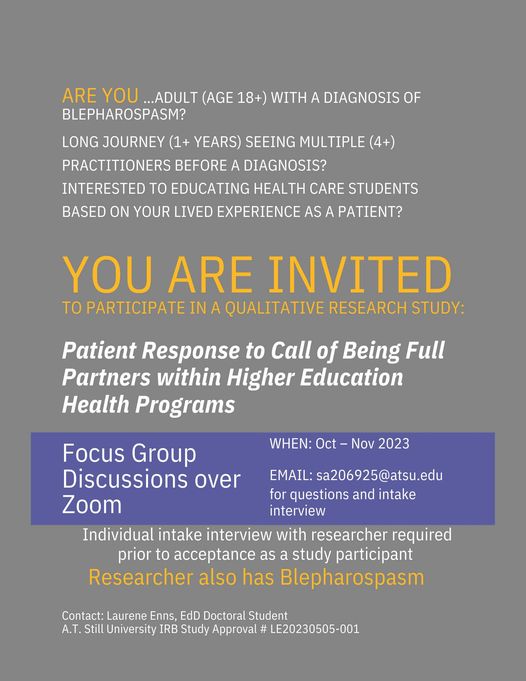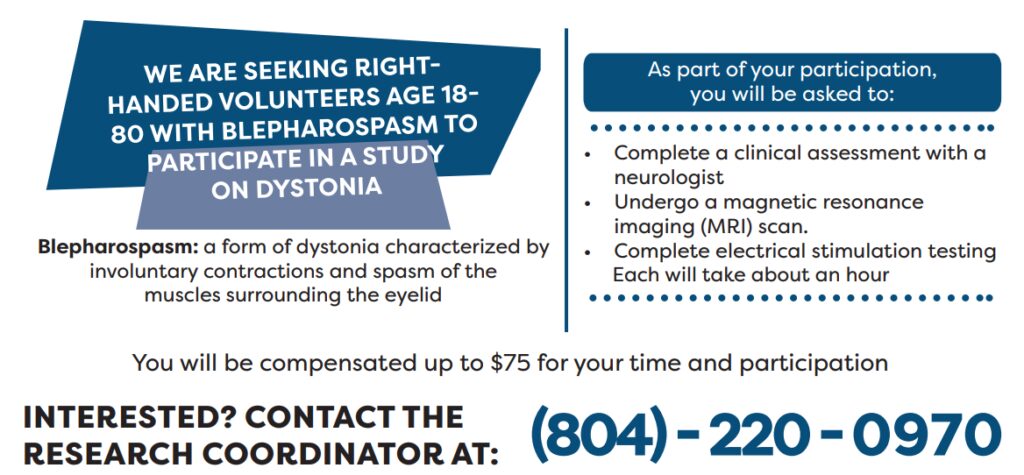Start a Support Group
We need Support Group Leaders! Many patients have volunteered to be Support Group leaders. The BEBRF office provides help to train you, schedule any meetings and coordinates the invitations for patients in your area. We are happy to answer any questions you may have. Please share your experience and help a fellow patient!
Please contact us if you can help us be a leader: bebrf@blepharospasm.org
Get involved in a Clinical Trial
On occasion, the Foundation will be asked to help with clinical trials that require blepharospasm patients’ participation. In those instances, the Foundation will publicize the call for patient subjects, and often help coordinate the volunteers. Any current call for clinical trials are listed below:

ANNOUNCING TWO EXCITING NEW RESEARCH TRIALS
Interested in participating in research study? The PMDC is inviting right-handed individuals with blepharospasm (a focal dystonia of the muscles around the eye) and healthy volunteers without dystonia age 18-80 to participate in a study investigating the role of inhibitory brain chemicals in blepharospasm symptoms. More details in the flyers below! For more information or to express interest in participating, please contact the research assistant (Caileigh) at (804)-220-0970 or by email at caileigh.dintino@vcuhealth.org.

The drug company ADDEX together with Dr. Buz Jinnah of Emory University (who serves on our MAB and the Medical and Scientific Advisory Council for DMRF) is launching a trial of a new class of medications known as allosteric modulators. The name of the drug they will use is dipraglurant. It is being studied for possible use with Parkinson’s disease and dystonias.
The study will be a small pilot trial of about 15 patients. The patients will take an oral medication and then stay at Emory University for several hours of observation, followed by a second dose. The next day, a third dose will be given. So, participation would require 2 days at Emory University in Atlanta.
If you are interested in participating in this research, please contact Cameron Injoo for further information: cameron.injoo.yeo@emory.edu
Other Research & Clinical Trial Information
Donate your brain for Research
Studies that have made important contributions to blepharospasm and dystonia would not have been possible if volunteers had not decided in advance to donate their brains to research. Brain donation provides the opportunity to contribute to the field of dystonia research for future generations. To understand the dystonias we must rely, to a large extent, on the analysis of donated brains. When scientists examine samples from donated brains and compare different age groups, genders, and so forth, they can begin to gain a better understanding and knowledge of this complicated disorder, which will lead to the development of novel therapeutics and treatments. This, in turn, will offer hope for dystonia-affected individuals and their families.
Volunteering your brain to science so that researchers can learn about dystonia is the greatest donation to research an individual can make.
The BEBRF, working with other organizations of the Dystonia Brain Collective, works in partnership with the Harvard Brain Tissue Resource Center (HBTRC) at McLean Hospital in Belmont, Massachusetts to assist people interested in registering as brain donors. The HBTRC maintains a private collection of brain tissue from individuals with all forms of dystonia.
There is no cost to the individual’s family. The family may have any sort of service or remembrance desired. The brain recovery is done discreetly and does not cause any disruption in those plans, or cause any change in the donor’s outward appearance.
If you or a family member are interested in brain donation, please see the information below or contact the office for assistance.
Help Increase Awareness
Would you like for BEBRF to fund more research or offer more services? Would you like to see people who are undiagnosed get help and treatments? Help out by raising awareness about blepharospasm and BEBRF. There are so many things that you can do to raise awareness, such as giving your friends and colleagues brochures about blepharospasm or putting them out at your church or doctor’s office. You can also talk about blepharospasm online or arrange for radio or television interviews if you have a connection to do that. The BEBRF office has many more ideas of how you can raise awareness in your neighborhood, your community, your world.
Offer Your Expertise
It takes all sorts of skills to make an organization like the BEBRF work. While the main workload is taken by our two-member office staff, supported by our Board, other volunteers run support group meetings, assist at medical Academies, write articles for the Newsletter and help in other ways. The problem is there is always more to do, so we are always looking for more help and skills. Blepharospasm patients come from all walks of life, and we’d love to hear from you if you have some special skills that could help us. For example, do you have:
- A legal background – you could help research issues for us
- A financial background – our Treasurer would like to hear from you
- An investment background – help us with periodic reviews of our assets
- A teaching background – help us with writing and advocacy
- Experience with fundraising – we need you!
- …and so on – we can find a role for people from almost any background
So, if you feel you would like to help the work of the Foundation, contact the office.
